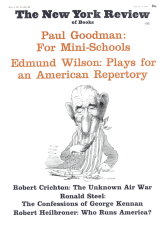In response to:
Bogey Men from the December 7, 1967 issue
To the Editors:
The review by A.J.P. Taylor of The Espionage Establishment by David Wise and Thomas B. Ross had a charmingly offhand quality. On page 14, for example, Taylor asks, “When has Intelligence, whether secret or not, been of the slightest use? The American Government had ‘magic’ in 1941 and therefore knew every detail of Japanese policy. Pearl Harbor happened all the same.”
As a former intelligence officer in the US Navy, may I point out that knowing “magic” did not mean that one could automatically and immediately read “magic” in any given month immediately after a minor code change, nor did it mean that one would know anything except those messages the Japanese would entrust to “magic.” Such messages were far from giving complete access to the Japanese diplomatic mind, as Taylor disingenuously suggests. These messages gave a partial access to that mind, and as was made obvious in the Pearl Harbor investigation, there could be disastrous delays in the sending, receipt, and decoding of such messages—at least from our point of view. All such information had to be checked against other information.
Again, Taylor makes no reference to the now well-publicized use of “magic” to reveal and exploit the Japanese plans for their assault on Midway. As a great turning point in human history, as a battle which surely shortened the war in the Pacific by several years (an American defeat might well have meant the temporary loss of the Hawaiian Islands), Midway is an absolutely clearcut example of the successful and useful employment of intelligence, mainly from “magic.”
I would further like to question Taygence…is a normal department of lor’s remark that “…Soviet intelligence…is a normal department of state.” There is now clear evidence that Soviet intelligence contains a branch devoted to kidnapping and murder. In spite of the James Bond fantasies of our movies and fiction, I doubt whether either England or America possesses such a branch either in the intelligence services or elsewhere in government.
Although I agree with the general position of Taylor that there are many foolish acts associated with the intelligence agencies of both sides and in fact am writing a comic novel about such typical acts, Intelligence has played a much larger part in shaping the course of history than many professional historians are aware of or willing to admit.
John Ashmead
Professor of English
Haverford College
Haverford, Pa.
This Issue
January 4, 1968



